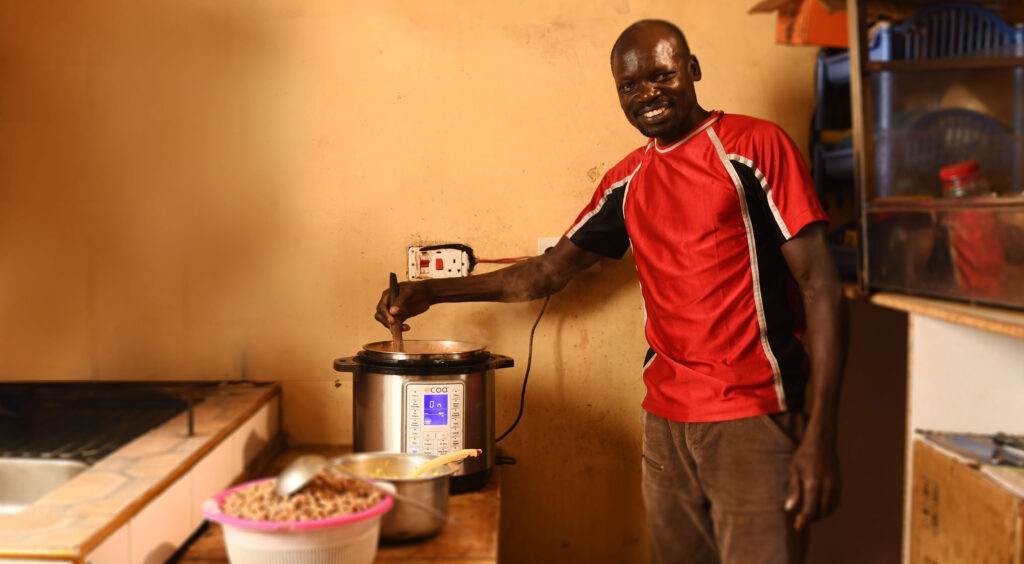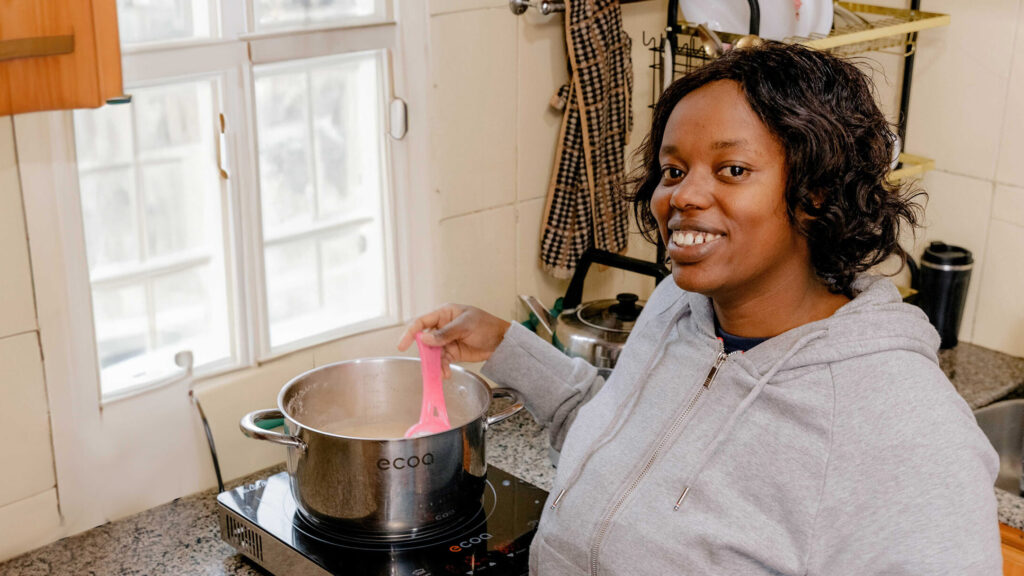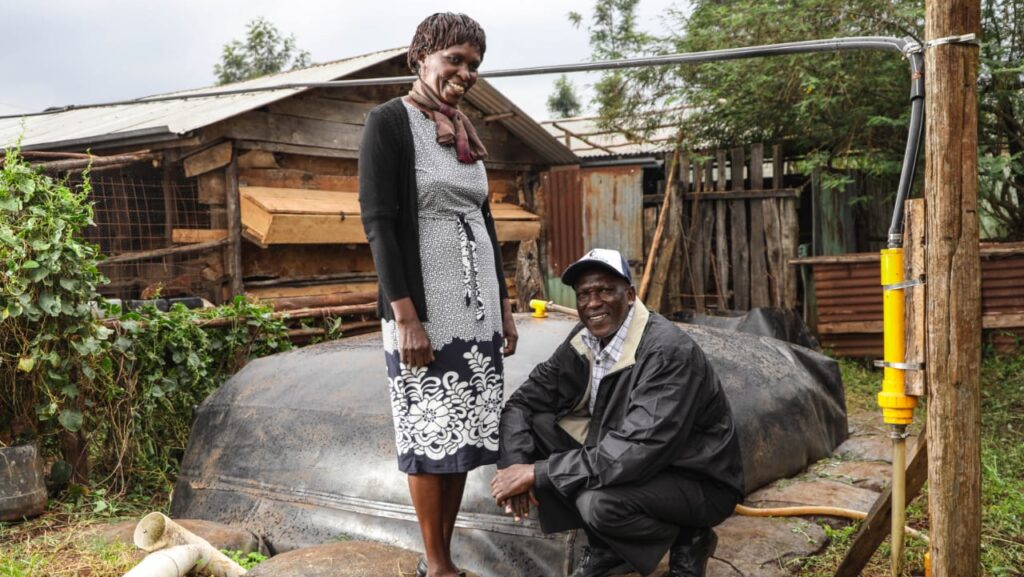Modern Cooking Facility for Africa: Accelerating a Green Transition in Clean Cooking
The Modern Cooking Facility for Africa (MCFA) is an innovative financing instrument established by the Nordic Environment Finance Corporation (Nefco), which incentivizes private companies to develop and sell clean cooking technologies. Funded by Sweden and the European Union, MCFA is currently capitalized at EUR 45 million and plans to open a new EUR 16 million funding round in November 2023 for companies in seven countries across Africa.
Ash Sharma, Head of the MCFA and Vice President at Nefco, spoke with the Clean Cooking Alliance (CCA) about the facility’s new investment round and aspirations to accelerate the green transition in the clean cooking market.
This interview is part of a series of conversations CCA is having with business leaders across the clean cooking sector.
 © BURN
© BURN
Clean Cooking Alliance (CCA): Tell us about Nefco and its work in the clean cooking sector.
Ash Sharma (Sharma): Nefco is an international financial institution owned by the five Nordic countries, and we manage external funds on behalf of Nordic and European governments, the European Union, and the Green Climate Fund. For the past five years, we have administered the Beyond the Grid Fund for Africa, a successful results-based financing instrument working on access to electricity—a component of Sustainable Development Goal 7 (SDG 7).
Together with our main development partner, the Swedish International Development Agency (Sida) we noted that the other side of the SDG 7 coin—access to modern, clean cooking—was underdeveloped, despite its huge impacts on health, especially for women and girls, and on the natural environment. While significant progress has been made, the sector has few major, private actors with proven, scalable business models, and it remains woefully underfunded.
Seeing a missing middle in financing for clean cooking, specifically around financing higher tier solutions, Nefco relied on partnering with the CCA team to provide market-building expertise with a nuanced understanding of how clean cooking differs from broader energy or electrification development efforts. This was critical to the development of the MCFA and an example of how institutions such as Nefco leverage the expertise of market builders like CCA with sector-specific expertise to move more money effectively and efficiently into the sector.
We then co-created with Sida the Modern Cooking Facility for Africa (MCFA) in late 2021, and we plan to open our second funding round in November to support companies across sub-Saharan Africa.
CCA: Can you give us more detail about this new round of funding?
Sharma: MCFA will launch a new funding round in response to significant demand for financial support from private sector companies working within the clean cooking and renewable energy sector. The funding will support companies to further expand and scale up their activities in the Democratic Republic of the Congo (DRC), Kenya, Malawi, Mozambique, Tanzania, Zambia and Zimbabwe.
Building on an external evaluation of the first MCFA funding round, we are seeking to offer more opportunities for clean cooking companies by changing the eligibility criteria and streamlining the application process. This will make MCFA funding more accessible to earlier stage companies.
The new MCFA funding round will be divided into two funding windows combining results-based financing and catalytic grant financing. The total available funding for both windows will be up to EUR 16 million, and the individual ticket sizes will vary from EUR 500,000 to EUR 2.5 million.
The funding will continue to support higher-tier cooking solutions, including electric cookstoves and stoves that use sustainably produced solid and liquid biofuels or biogas solutions. In addition, the new funding round will also be available to clean cooking companies using liquified petroleum gas (LPG) in DRC, Malawi, Mozambique, Tanzania, and Zambia.
 © BURN
© BURN
CCA: Nefco has been funding clean cooking for some time, particularly through your results-based finance (RBF) instrument. What lessons have you learned?
Sharma: Prior to MCFA, Nefco had been working for more than 15 years with clean cooking under the carbon markets. With the first call for proposals (MCFA1) closing, we undertook an early evaluation. While successful, we found that the ticket size, grant amount, and co-financing requirements were deemed too high for some companies in emerging clean cooking markets, as well as for companies expanding to new, riskier markets.
In the spirit of adaptation to market conditions, one of the main innovations will be splitting MCFA2 into two separate offerings: a “scale-up” RBF, which should remain broadly similar to MCFA1 (albeit with lower co-financing requirements), and a “catalytic RBF” targeting earlier stage companies and markets.
Many stakeholders also challenged the decision to exclude LPG in MCFA1, especially in less mature markets where LPG is the most widely available or feasible clean fuel and is supportive of host government priorities. We listened to that and will include LPG within the typology of eligible technologies in certain countries. We will also introduce Malawi as a new country of operation.
CCA: How is the funding incentivizing companies to scale and innovate?
Sharma: Although investment in the clean cooking sector has gradually increased, it is still well below the levels needed to achieve universal access to clean cooking. Modern cooking companies typically struggle to access finance and have largely relied on development partners for funding. However, a small number of companies are gaining access to commercial capital. MCFA can play a role in accelerating that shift, while also providing an evidence base for higher-tier cooking solutions.
When evaluating applicants, additionality is uppermost in our minds: we want to accelerate the green transition and to use limited amounts of public funds to do so. Our funding should encourage investors to invest where they otherwise wouldn’t.
For example, we support companies such as Lanforce Trading in Zimbabwe or BURN Manufacturing in Kenya, which have experience with last-mile distribution but less experience with scaling technologies such as biodigesters and e-cooking and de-risking expansion into new territories.
Despite low overall investment levels, the global funding landscape for clean cooking has begun to change over the past five years. The growth in private financing is driven by institutional investors, private equity, venture capital, and impact investors. At Nefco, we want to help drive that change by demonstrating the viability of our investees to scale their businesses whilst offering affordable, higher-tier solutions.
 © Lanforce Energy
© Lanforce Energy
CCA: How is Nefco responding to both the opportunity and risks of carbon revenue for clean cooking?
Sharma: We believe carbon finance can be a gamechanger for the economics of clean cooking. MCFA wants to support our investees by enabling access to carbon revenue. The larger companies already do so, but some face financing barriers, which we hope to overcome by providing incentives for stove use monitoring technologies, which are critical to enabling the next generation of carbon markets. We also provide free technical assistance to MCFA portfolio companies, typically provided by seasoned carbon market participants.
Here, I would also like to highlight the power of our partnership with CCA. Nefco and CCA work together to mobilize high-integrity carbon finance as part of innovative business and financing models, enabling companies to lower costs to consumers and to ensure the full range of benefits clean cooking can deliver.
I have been honoured, together with Sophie Odupoy from KOKO Networks, to be one of the co-chairs of the CCA’s Responsible Carbon Finance Working Groups. Together with over 530 stakeholders, representing 267 institutions, from across clean cooking and carbon markets. We developed a set of 12 Interim Principles to strengthen the underlying conditions of trust and confidence needed for the carbon market to flourish; helping buyers to reengage in clean cooking carbon projects with confidence.
Nefco and CCA also collaborate on piloting consumer principles to promote high industry standards in clean cooking; mobilizing private finance to accelerate investment in the sector; and knowledge management to promote modern cooking solutions.
CCA: RBFs tend to have a short cycle of 3-5 years. What is the duration of Nefco funding and how do you enable grant recipients to exit to other forms of financing?
Sharma: The sustainability of business models is central to our thinking. We place great emphasis during due diligence reviews on committed co-financing and, later, on leveraging additional investment over the lifetime of the agreements, which run for four years. As our companies achieve scale and demonstrate traction, they need to be able to access additional sources of capital, which form specific milestones in our agreements.
Nefco supports companies by collaborating with investment facilitation services such as GET.invest and PFAN, and we are in dialogue with other financiers to securitize future RBF and carbon finance receivables.
By promoting market development and more penetration of higher-tier, modern cooking services, MCFA investees can use this track record to raise additional capital. Commercial investors are typically more concerned about a company’s profitability and scale, which MCFA can help companies achieve. Investees are encouraged to develop strategies on how they will sustain their business after the RBF expires, and MCFA can provide technical assistance for smaller companies.
MCFA’s work to promote carbon finance will be a critical component for the long-term sustainability of its portfolio companies. Our collaboration with CCA’s Partnership Platform for Clean Cooking Finance is a key part of our sustainability plan because the Platform brings together numbers of banking, investment, guarantee, and insurance sector players to actively de-risk investment in clean cooking carbon projects.
